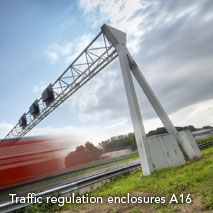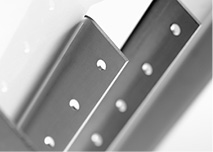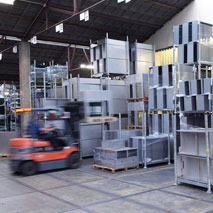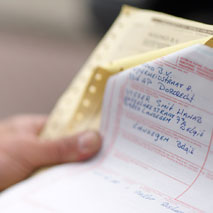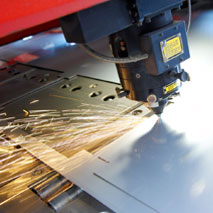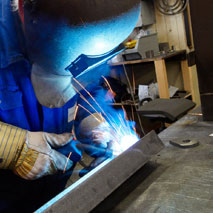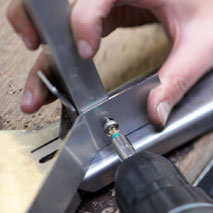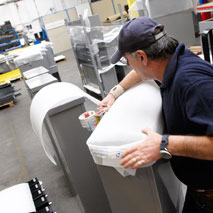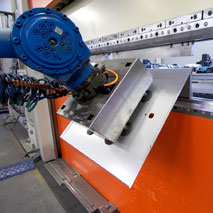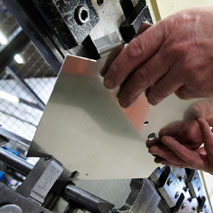General Conditions for the Supply of Mechanical, Electrical and Electronic Products
ORGALIME S 2000
Brussels, August 2000
Download General Conditions (pdf)
Preamble
1. These General Conditions shall apply when the parties agree in writing or otherwise thereto. When the General Conditions apply to a specific contract, modifications of or deviations from them must be agreed in writing.
The object(s) to be supplied under these General Conditions is (are) hereinafter referred to as the Product.
Wherever these General Conditions use the term in writing, this shall mean by document signed by the parties, or by letter, fax, electronic mail and by such other means as are agreed by the parties.
Product information
2. All information and data contained in general product documentation and price lists, whether in electronic or any other form, are binding only to the extent that they are by reference expressly included in the contract.
Drawings and descriptions
3. All drawings and technical documents relating to the Product or its manufacture submitted by one party to the other, prior or subsequent to the formation of the contract, shall remain the property of the submitting party.
Drawings, technical documents or other technical information received by one party shall not, without the consent of the other party, be used for any other purpose than that for which they were provided. They may not, without the consent of the submitting party, otherwise be used or copied, reproduced, transmitted or communicated to a third party.
4. The Supplier shall, not later than at the date of delivery, provide free of charge information and drawings which are necessary to permit the Purchaser to erect, commission, operate and maintain the Product. Such information and drawings shall be supplied in the number of copies agreed upon or at least one copy of each. The Supplier shall not be obliged to provide manufacturing drawings for the Product or for spare parts.
Acceptance tests
5. Acceptance tests provided for in the contract shall, unless otherwise agreed, be carried out at the place of manufacture during normal working hours.
If the contract does not specify the technical requirements, the tests shall be carried out in accordance with general practice in the appropriate branch of industry concerned in the country of manufacture.
6. The Supplier shall notify the Purchaser in writing of the acceptance tests in sufficient time to permit the Purchaser to be represented at the tests. If the Purchaser is not represented, the test report shall be sent to the Purchaser and shall be accepted as accurate.
7. If the acceptance tests show the Product not to be in accordance with the contract, the Supplier shall without delay remedy any deficiencies in order to ensure that the Product complies with the contract. New tests shall then be carried out at the Purchaser’s request, unless the deficiency was insignificant.
8. The Supplier shall bear all costs for acceptance tests carried out at the place of manufacture. The Purchaser shall however bear all travelling and living expenses for his representatives in connection with such tests.
Delivery. Passing of risk
9. Any agreed trade term shall be construed in accordance with the INCOTERMS in force at the formation of the contract.
If no trade term is specifically agreed, the delivery shall be Ex works (EXW).
If, in the case of delivery Ex works, the Supplier, at the request of the Purchaser, undertakes to send the Product to its destination, the risk will pass not later than when the Product is handed over to the first carrier.
Partial shipments shall be permitted unless otherwise agreed.
Time for delivery. Delay
10. If the parties, instead of specifying the date for delivery, have specified a period of time on the expiry of which delivery shall take place, such period shall start to run as soon as the contract is entered into, all official formalities have been completed, payments due at the formation of the contract have been made, any agreed securities have been given and any other preconditions have been fulfilled.
11. If the Supplier anticipates that he will not be able to deliver the Product at the time for delivery, he shall forthwith notify the Purchaser thereof in writing, stating the reason, and, if possible, the time when delivery can be expected.
If the Supplier fails to give such notice, the Purchaser shall be entitled to compensation for any additional costs which he incurs and which he could have avoided had he received such notice.
12. If delay in delivery is caused by any of the circumstances mentioned in Clause 39 or by an act or omission on the part of the Purchaser, including suspension under Clauses 20 or 42, the time for delivery shall be extended by a period which is reasonable having regard to all the circumstances in the case. This provision applies regardless of whether the reason for the delay occurs before or after the agreed time for delivery.
13. If the Product is not delivered at the time for delivery (as defined in Clauses 10 and 12), the Purchaser is entitled to liquidated damages from the date on which delivery should have taken place.
The liquidated damages shall be payable at a rate of 0.5 per cent of the purchase price for each completed week of delay. The liquidated damages shall not exceed 7.5 per cent of the purchase price.
If only part of the Product is delayed, the liquidated damages shall be calculated on that part of the purchase price which is attributable to such part of the Product as cannot in consequence of the delay be used as intended by the parties.
The liquidated damages become due at the Purchaser’s demand in writing but not before delivery has been completed or the contract is terminated under Clause 14.
The Purchaser shall forfeit his right to liquidated damages if he has not lodged a claim in writing for such damages within six months after the time when delivery should have taken place.
14. If the delay in delivery is such that the Purchaser is entitled to maximum liquidated damages under Clause 13 and if the Product is still not delivered, the Purchaser may in writing demand delivery within a final reasonable period which shall not be less than one week.
If the Supplier does not deliver within such final period and this is not due to any circumstance for which the Purchaser is responsible, then the Purchaser may by notice in writing to the Supplier terminate the contract in respect of such part of the Product as cannot in consequence of the Supplier’s failure to deliver be used as intended by the parties.
If the Purchaser terminates the contract he shall be entitled to compensation for the loss he has suffered as a result of the Supplier’s delay. The total compensation, including the liquidated damages which are payable under Clause 13, shall not exceed 15 per cent of that part of the purchase price which is attributable to the part of the Product in respect of which the contract is terminated.
The Purchaser shall also have the right to terminate the contract by notice in writing to the Supplier, if it is clear from the circumstances that there will occur a delay in delivery which, under Clause 13 would entitle the Purchaser to maximum liquidated damages.
In case of termination on this ground, the Purchaser shall be entitled to maximum liquidated damages and compensation under the third paragraph of this Clause 14.
15. Liquidated damages under Clause 13 and termination of the contract with limited compensation under Clause 14 are the only remedies available to the Purchaser in case of delay on the part of the Supplier. All other claims against the Supplier based on such delay shall be excluded, except where the Supplier has been guilty of gross negligence.
In these General Conditions gross negligence shall mean an act or omission implying either a failure to pay due regard to serious consequences, which a conscientious supplier would normally foresee as likely to ensue, or a deliberate disregard of the consequences of such act or omission.
16. If the Purchaser anticipates that he will be unable to accept delivery of the Product at the delivery time, he shall forthwith notify the Supplier in writing thereof, stating the reason and, if possible, the time when he will be able to accept delivery.
If the Purchaser fails to accept delivery at the delivery time, he shall nevertheless pay any part of the purchase price which becomes due on delivery, as if delivery had taken place. The Supplier shall arrange for storage of the Product at the risk and expense of the Purchaser. The Supplier shall also, if the Purchaser so requires, insure the Product at the Purchaser’s expense.
17. Unless the Purchaser’s failure to accept delivery is due to any such circumstance as mentioned in Clause 39, the Supplier may by notice in writing require the Purchaser to accept delivery within a final reasonable period.
If, for any reason for which the Supplier is not responsible, the Purchaser fails to accept delivery within such period, the Supplier may by notice in writing terminate the contract in whole or in part. The Supplier shall then be entitled to compensation for the loss he has suffered by reason of the Purchaser’s default. The compensation shall not exceed that part of the purchase price which is attributable to that part of the Product in respect of which the contract is terminated.
Payment
18. Unless otherwise agreed, the purchase price shall be paid with one third at the formation of the contract and one third when the Supplier notifies the Purchaser that the Product, or the essential part of it, is ready for delivery. Final payment shall be made when the Product is delivered.
Payments shall be made within 30 days of the date of the invoice.
19. Whatever the means of payment used, payment shall not be deemed to have been effected before the Supplier’s account has been fully and irrevocably credited.
20. If the Purchaser fails to pay by the stipulated date, the Supplier shall be entitled to interest from the day on which payment was due. The rate of interest shall be as agreed between the parties. If the parties fail to agree on the rate of interest, it shall be 8 percentage points above the rate of the main refinancing facility of the European Central Bank in force on the due date of payment.
In case of late payment the Supplier may, after having notified the Purchaser in writing, suspend his performance of the contract until he receives payment.
If the Purchaser has not paid the amount due within three months the Supplier shall be entitled to terminate the contract by notice in writing to the Purchaser and to claim compensation for the loss he has incurred. The compensation shall not exceed the agreed purchase price.
Retention of title
21. The Product shall remain the property of the Supplier until paid for in full to the extent that such retention of title is valid under the applicable law.
The Purchaser shall at the request of the Supplier assist him in taking any measures necessary to protect the Supplier’s title to the Product in the country concerned.
The retention of title shall not affect the passing of risk under Clause 9.
Liability for defects
22. Pursuant to the provisions of Clauses 23-37 inclusive, the Supplier shall remedy any defect or nonconformity (hereinafter termed defect(s)) resulting from faulty design, materials or workmanship.
23. The Supplier’s liability is limited to defects which appear within a period of one year from delivery. If the daily use of the Product exceeds that which is agreed, this period shall be reduced proportionately.
24. When a defect in a part of the Product has been remedied, the Supplier shall be liable for defects in the repaired or replaced part under the same terms and conditions as those applicable to the original Product for a period of one year. For the remaining parts of the Product the period mentioned in Clause 23 shall be extended only by a period equal to the period during which the Product has been out of operation as a result of the defect.
25. The Purchaser shall without undue delay notify the Supplier in writing of any defect which appears. Such notice shall under no circumstance be given later than two weeks after the expiry of the period given in Clause 23.
The notice shall contain a description of the defect.
If the Purchaser fails to notify the Supplier in writing of a defect within the time limits set forth in the first paragraph of this Clause, he loses his right to have the defect remedied.
Where the defect is such that it may cause damage, the Purchaser shall immediately inform the Supplier in writing. The Purchaser shall bear the risk of damage resulting from his failure so to notify.
26. On receipt of the notice under Clause 25 the Supplier shall remedy the defect without undue delay and at his own cost as stipulated in Clauses 22-37 inclusive.
Repair shall be carried out at the place where the Product is located unless the Supplier deems it appropriate that the defective part or the Product is returned to him for repair or replacement.
The Supplier is obliged to carry out dismantling and re-installation of the part if this requires special knowledge. If such special knowledge is not required, the Supplier has fulfilled his obligations in respect of the defect when he delivers to the Purchaser a duly repaired or replaced part.
27. If the Purchaser has given such notice as mentioned in Clause 25 and no defect is found for which the Supplier is liable, the Supplier shall be entitled to compensation for the costs he has incurred as a result of the notice.
28. The Purchaser shall at his own expense arrange for any dismantling and reassembly of equipment other than the Product, to the extent that this is necessary to remedy the defect.
29. Unless otherwise agreed, necessary transport of the Product and/or parts thereof to and from the Supplier in connection with the remedying of defects for which the Supplier is liable shall be at the risk and expense of the Supplier. The Purchaser shall follow the Supplier’s instructions regarding such transport.
30. Unless otherwise agreed, the Purchaser shall bear any additional costs which the Supplier incurs for repair, dismantling, installation and transport as a result of the Product being located in a place other than the destination stated in the contract or – if no destination is stated – the place of delivery.
31. Defective parts which have been replaced shall be made available to the Supplier and shall be his property.
32. If, within a reasonable time, the Supplier does not fulfil his obligations under Clause 26, the Purchaser may by notice in writing fix a final time for completion of the Supplier’s obligations.
If the Supplier fails to fulfil his obligations within such final time, the Purchaser may himself undertake or employ a third party to undertake necessary remedial works at the risk and expense of the Supplier.
Where successful remedial works have been undertaken by the Purchaser or a third party, reimbursement by the Supplier of reasonable costs incurred by the Purchaser shall be in full settlement of the Supplier’s liabilities for the said defect.
33. Where the defect has not been successfully remedied, as stipulated under Clause 32,
a) the Purchaser is entitled to a reduction of the purchase price in proportion to the reduced value of the Product, provided that under no circumstance shall such reduction exceed 15 per cent of the purchase price, or
b) where the defect is so substantial as to significantly deprive the Purchaser of the benefit of the contract, the Purchaser may terminate the contract by notice in writing to the Supplier. The Purchaser is then entitled to compensation for the loss he has suffered up to a maximum of 15 per cent of the purchase price.
34. The Supplier is not liable for defects arising out of materials provided, or a design stipulated or specified by the Purchaser.
35. The Supplier is liable only for defects which appear under the conditions of operation provided for in the contract and under proper use of the Product.
The Supplier’s liability does not cover defects which are caused by faulty maintenance, incorrect erection or faulty repair by the Purchaser, or by alterations carried out without the Supplier’s consent in writing.
Finally the Supplier’s liability does not cover normal wear and tear or deterioration.
36. Notwithstanding the provisions of Clauses 22-35 the Supplier shall not be liable for defects in any part of the Product for more than two years from the beginning of the period given in Clause 23.
37. Save as stipulated in Clauses 22-36, the Supplier shall not be liable for defects. This applies to any loss the defect may cause including loss of production, loss of profit and other indirect loss. This limitation of the Supplier’s liability shall not apply if he has been guilty of gross negligence as defined in Clause 15.
Allocation of liability for damage caused by the product
38. The Supplier shall not be liable for any damage to property caused by the Product after it has been delivered and whilst it is in the possession of the Purchaser. Nor shall the Supplier be liable for any damage to products manufactured by the Purchaser, or to products of which the Purchaser’s products form a part.
If the Supplier incurs liability towards any third party for such damage to property as described in the preceding paragraph, the Purchaser shall indemnify, defend and hold the Supplier harmless.
If a claim for damage as described in this Clause is lodged by a third party against one of the parties, the latter party shall forthwith inform the other party thereof in writing.
The Supplier and the Purchaser shall be mutually obliged to let themselves be summoned to the court or arbitral tribunal examining claims for damages lodged against one of them on the basis of damage allegedly caused by the Product.
The limitation of the Supplier’s liability in the first paragraph of this Clause shall not apply where the Supplier has been guilty of gross negligence as defined in Clause 15.
Force majeure
39. Either party shall be entitled to suspend performance of his obligations under the contract to the extent that such performance is impeded or made unreasonably onerous by any of the following circumstances: industrial disputes and any other circumstance beyond the control of the parties such as fire, war, extensive military mobilization, insurrection, requisition, seizure, embargo, restrictions in the use of power and defects or delays in deliveries by sub-contractors caused by any such circumstance referred to in this Clause.
A circumstance referred to in this Clause whether occurring prior to or after the formation of the contract shall give a right to suspension only if its effect on the performance of the contract could not be foreseen at the time of the formation of the contract.
40. The party claiming to be affected by Force Majeure shall notify the other party in writing without delay on the intervention and on the cessation of such circumstance.
If Force Majeure prevents the Purchaser from fulfilling his obligations, he shall compensate the Supplier for expenses incurred in securing and protecting the Product.
41. Regardless of what might otherwise follow from these General Conditions, either party shall be entitled to terminate the contract by notice in writing to the other party if performance of the contract is suspended under Clause 39 for more than six months.
Anticipated non-performance
42. Notwithstanding other provisions in these General Conditions regarding suspension, each party shall be entitled to suspend the performance of his obligations under the contract, where it is clear from the circumstances that the other party will not be able to perform his obligations. A party suspending his performance of the contract shall forthwith notify the other party thereof in writing.
Consequential losses
43. Save as otherwise stated in these General Conditions there shall be no liability for either party towards the other party for loss of production, loss of profit, loss of use, loss of contracts or for any other consequential or indirect loss whatsoever.
Disputes and applicable law
44. All disputes arising out of or in connection with the contract shall be finally settled under the Rules of Arbitration of the International Chamber of Commerce by one or more arbitrators appointed in accordance with the said rules.
45. The contract shall be governed by the substantive law of the Supplier’s country.
This is an Orgalime publication. Orgalime groups the central trade federations of the mechanical, electrical, electronic and metalworking industries in eighteen European countries and provides liaison between these organisations in the legal, technical and economic fields.
All rights reserved © Editeur responsable : Adrian Harris, Secretary General
ORGALIME “Diamant” building, Boulevard A. Reyers 80, B – 1030 Bruxelles
Tel : (32) 2 706 82 35 – Fax : (32) 2 706 82 50 – e-mail : secretariat@orgalime.org







